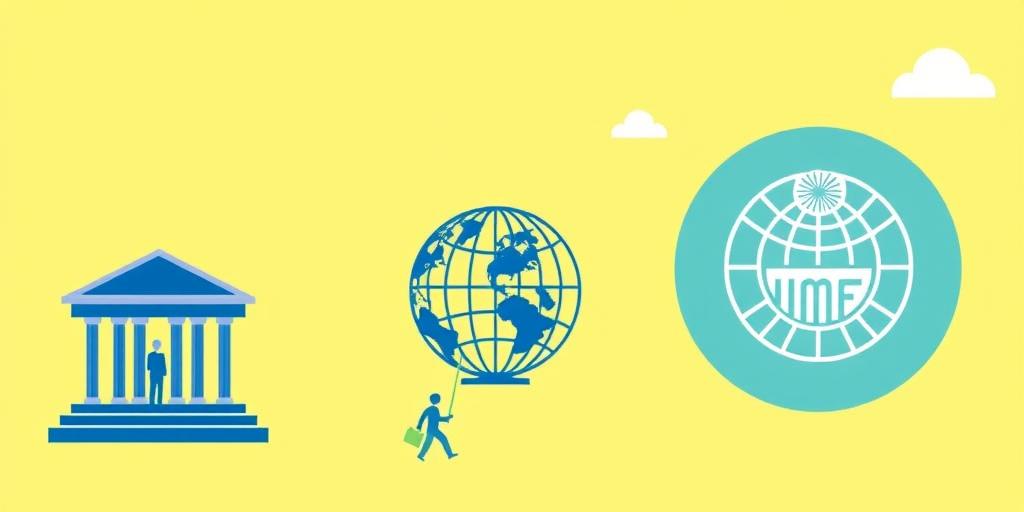The Role of the World Bank and IMF in Global Development
The World Bank and the International Monetary Fund (IMF) are two of the most influential international financial institutions in the world. Both organizations play a critical role in global development by providing financial and technical assistance to developing countries. However, their approaches, mandates, and impacts differ significantly.
Origins and Mandates
- World Bank: Established in 1944, the World Bank's primary goal is to reduce poverty and promote sustainable development. It provides loans, grants, and technical assistance to governments of developing countries for a wide range of projects in sectors such as education, health, infrastructure, and agriculture.
- IMF: Also founded in 1944, the IMF's main objective is to ensure the stability of the international monetary system. It monitors economic and financial developments, provides policy advice, and offers financial assistance to countries facing balance of payments problems.
Key Functions and Activities
World Bank:
The World Bank focuses on long-term economic development and poverty reduction through:
- Project Financing: Funding specific development projects in areas like infrastructure, education, and healthcare.
- Policy Advice: Providing guidance to governments on economic and social policies.
- Technical Assistance: Offering expertise and training to build institutional capacity.
- Research and Analysis: Conducting research and providing data on development issues.
IMF:
The IMF works to maintain global economic stability through:
- Surveillance: Monitoring the economic policies of member countries.
- Financial Assistance: Providing loans to countries facing financial crises.
- Technical Assistance: Offering expertise in areas like fiscal policy and banking supervision.
- Capacity Development: Helping countries strengthen their economic institutions.
Impact and Criticisms
Both the World Bank and the IMF have had a significant impact on global development, but their activities have also faced criticism:
World Bank:
- Positive Impacts: Significant contributions to poverty reduction, improved health outcomes, and increased access to education in many developing countries.
- Criticisms: Some projects have been criticized for their environmental and social impacts. Conditionality attached to loans has also been a point of contention.
IMF:
- Positive Impacts: Helping countries stabilize their economies during financial crises and promoting sound macroeconomic policies.
- Criticisms: Conditionality attached to loans (structural adjustment programs) has been criticized for leading to austerity measures and negative social impacts.
The Role of Conditionality
One of the most debated aspects of the World Bank and IMF's operations is the use of conditionality. Conditionality refers to the policy changes that borrowing countries must implement as a condition for receiving loans. These conditions often include measures such as:
- Fiscal austerity (reducing government spending)
- Privatization of state-owned enterprises
- Trade liberalization
While the intention behind conditionality is to promote sound economic policies and ensure that loans are used effectively, critics argue that it can lead to negative social and economic consequences, particularly for the poor and vulnerable.
Current Challenges and Future Directions
The World Bank and the IMF face numerous challenges in the 21st century, including:
- Climate Change: Addressing the impacts of climate change on developing countries.
- Inequality: Reducing income inequality and promoting inclusive growth.
- Debt Sustainability: Helping countries manage their debt levels.
- Fragile States: Supporting countries affected by conflict and instability.
To address these challenges, both institutions are adapting their strategies and approaches. This includes:
- Increasing their focus on climate finance and green development.
- Promoting policies that foster inclusive growth and reduce inequality.
- Strengthening their partnerships with other development actors, including governments, civil society organizations, and the private sector.
Conclusion
The World Bank and the IMF play vital roles in global development by providing financial and technical assistance to developing countries. While their activities have faced criticism, both institutions continue to evolve and adapt to the changing needs of the global economy. Their ability to address current challenges and promote sustainable and inclusive development will be critical in the years to come. Understanding their mandates, functions, and impacts is essential for anyone interested in the field of international development and global economics.









